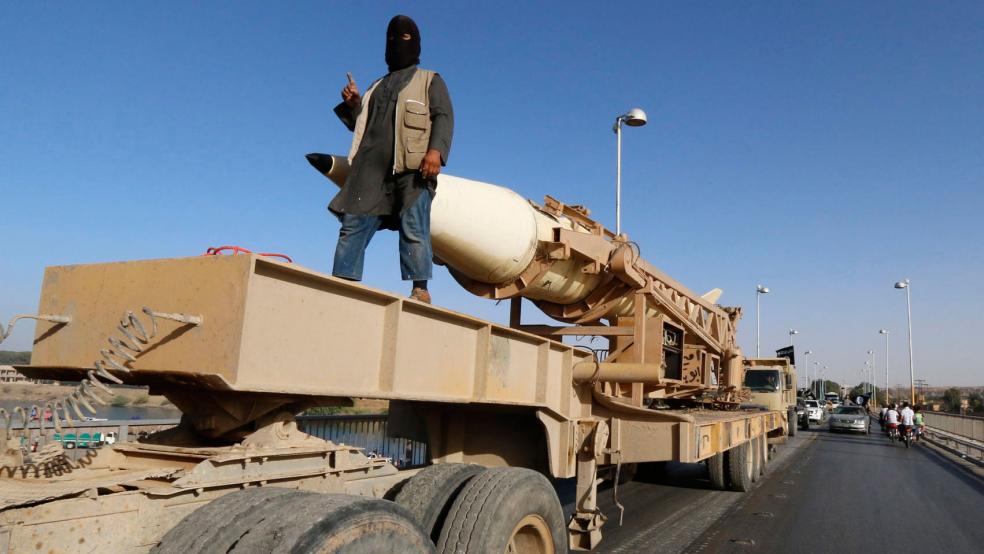It is baffling, and unfortunately important, that the Arabs cannot build a modern state. The ones they have built are monsters, rattletrap Frankensteins whose efficiency only extends to their secret police. None provide for even the most basic social and political freedom of their citizens, and in every indicator of healthy modern life tracked by the World Bank, the Arab states rank near the bottom. Something has gone wrong. And it is possible that the Islamic State’s moment – terrible in other ways – offers them a chance to fix it.
One of the basic problems is that most of the Arab societies have never had a real social upheaval, which would have been a shove into the modern world. They have had dozens of coups, countless military strongmen, and the sort of hereditary monarchies that fell out of fashion in Europe two centuries ago; but no total upheavals like 1917 in Russia or 1979 in Iran. Their latest bid for modernity was an Arab Spring that ended everywhere in dictatorship or civil war; but no popular revolutions that successfully remade their societies in different image.
Related: ISIS Attacks Tunisia, the Sole Arab Spring Success
Revolutions are a bit like the tip of an iceberg poking out above the water, in which the other ninety percent of social change is invisible below the waterline. That ninety percent was what was needed back in 1947 (China), and was what the kings and Baathists who took power from the Mandates totally lacked. The Baathists borrowed a brutal form of socialism from the Soviets, but only so much; they liked the authoritarianism and social promises of the Second World, but were uninterested in fundamentally remaking the societies they found. The monarchies that survived decolonization were also uninterested in upheaval, and kept power concentrated in a few traditional hands.
What this meant was that the Arabs were never really affected by the great contest between the US and USSR about legitimacy and what sort of state would rule best. That was the point of the Cold War, after all: the militarized argument between de Tocqueville and Karl Marx about how to achieve a free modernity. The Frenchman argued that democracy could be brought about by guaranteeing certain freedoms, like speech and association; but Marx believed that remaking the social or economic order was necessary also, to remove the coercion of joblessness along with the coercion of the king.
Propped up by outside powers, focused on Israel, the Arab regimes mostly missed this discussion and it was readily apparent, most embarrassingly on the battlefield. In the modern world, education, high technology, and social coherence play a critical role in making armies lethal, and sick states can’t win interstate wars. Their troops couldn’t repair tanks; their ground forces showed no initiative; and their command structures were hopelessly calcified. So the Arab elites lost their Israel wars and were left with nothing. No freedom, no prosperity, and no victory.
Related: U.S. Cost of Fighting ISIS Nears $2 Billion
That wouldn’t really be a problem for America – it is not the world’s social worker, after all – except September 11th happened, and Americans noticed an unfortunate correlation between Islamic radicalism and sick Arab states. What’s more, the trend lines were going in the wrong direction. Over the last thirty-five years since it became a thing, Islamic radicalism has steadily grown worse and more prevalent until it reached its (current) apotheosis in the Islamic State, or ISIS.
ISIS represents a top-to-bottom reshuffling of Arab society, and a state with a genuine political compact encompassing at least some of Marx and Tocqueville’s participatory freedoms. Even more than al-Qaeda, it has rattled the region’s traditional regimes and emirs - not because it is brutal, but because it is genuinely revolutionary. It is something new.
That’s also why defeating the Islamic State may be harder than we think. Underlying of all the day-to-day complaints about this new war – that American and Iranian forces are incompatible, that US air support is spotty, or that the Iranian-backed militias are genocidal – is the basic problem that we have nothing good to offer the Arabs in exchange.
Related: How Iran Is Taking Over the Middle East
What, exactly, is the replacement for ISIS? Saddam? Assad? Khomeini? Sisi? Any of the King Abdullahs? None of them ruled what we would describe as particularly healthy states. Tunisia, maybe. But imposing that wealthy Carthaginian outlier’s nascent democracy on the heart of the Levant seems like a tall order.
The Islamic State has thus brought the Arabs a moment of reckoning. It has tried to solve the riddle of the Arab state with a new answer, however cruel; but most critically, it has reminded the regimes that an answer is necessary. The present state of affairs cannot continue.
For the first time since Nasser knocked over the ancien child-king of Egypt, the Arabs have a moment to discuss what sort of society beyond their elites they want to build. If they are ever to emerge from the shadow, there has to be more to the governing compact between their rulers and ruled than force. The Arabs will not be serfs forever. So what can those rulers offer in exchange?
Top Reads from The Fiscal Times:






